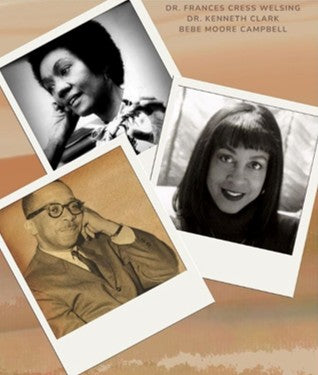
Black Pioneers in Mental Wellness
Mental health has long been an essential yet often overlooked aspect of overall wellbeing. For Black communities, the stigma surrounding mental health, compounded by a history of oppression and state-sanctioned violence, have often made it difficult to seek help and prioritize self-care. However, numerous Black mental health pioneers have fought to shift this narrative, creating lasting change in how we view mental health and care. Here, we highlight three influential figures who have made a profound impact on self-care, well-being, and mental health awareness.
1. Dr. Frances Cress Welsing

Dr. Frances Cress Welsing was a pioneering psychiatrist and one of the most prominent Black voices in mental health advocacy. Her groundbreaking work focused on the relationship between race and mental health, emphasizing how societal racism and white supremacy negatively impact the psyche of Black individuals.
In her landmark book, The Isis Papers: The Keys to the Colors, Dr. Welsing discussed the psychological trauma caused by systemic racism and how it manifests in Black people's lives. She explored how this trauma affects mental health and recommended strategies for healing, including the importance of developing strong, positive self-identity, and the power of self-love.
Her work paved the way for a deeper understanding of how racial oppression influences mental health, promoting the idea that self-care for Black people must involve both individual healing and collective empowerment. Dr. Welsing’s contributions have inspired many to advocate for mental health in Black communities while addressing the cultural and social factors that exacerbate mental health challenges.
2. Dr. Kenneth Clark

Dr. Kenneth Clark, a distinguished psychologist, was a trailblazer in the field of mental health and one of the first to explore the psychological impact of segregation on Black children. Along with his wife, Dr. Mamie Phipps Clark, Dr. Kenneth Clark conducted the famous “doll tests,” which revealed that racial segregation had a detrimental effect on the self-esteem of Black children.
This research played a significant role in the landmark 1954 Supreme Court case, Brown v. Board of Education, which led to the desegregation of schools in America. Dr. Clark’s work showcased the importance of recognizing and addressing the deep-rooted psychological effects of racism in our country, leading to a greater emphasis on mental health care in Black communities and the need for positive self-identity in Black youth.
Beyond his research, Dr. Clark was a passionate advocate for mental health education and promoting policies that would address the needs of marginalized communities. His advocacy helped pave the way for increased mental health resources and support systems for Black families.
3. Bebe Moore Campbell

Bebe Moore Campbell was an author, journalist, and mental health advocate who dedicated much of her life to addressing the stigma of mental health within the Black community. As a co-founder of the National Alliance of Black Mental Health Professionals, Campbell worked tirelessly to raise awareness about mental health issues and advocate for culturally competent mental health care.
In her 2004 book, Suffering in Silence: Black Women and Depression, Campbell explored how mental health issues like depression disproportionately affect Black women, but often go undiagnosed or untreated due to cultural stigmas and a lack of understanding from healthcare providers. Through her writing and advocacy, Campbell encouraged members of the Black community to openly discuss mental health challenges and seek help when needed.
Campbell's work helped bring mental health to the forefront of Black self-care discussions, emphasizing that caring for one’s mind was as important as caring for one’s body. She is also remembered for her role in creating spaces for Black people to talk about mental health and share their experiences in a supportive environment.
A Lasting Impact....
These pioneers helped break down barriers and reshape the way that Black people approach mental health and self-care. They recognized that addressing what we now refer to as "racism-based trauma" is an integral part of mental wellbeing, and that self-care must be understood within the context of one’s identity, community, and lived experiences.
Whether through therapy, support groups, self-education, somatic work, or mindfulness practices, the work of these trailblazers has made it clear that mental health is not just an individual issue but a collective one that requires community support and understanding. Incorporating practices of self-love, identity affirmation, and community healing into our lives can make a powerful difference in how we navigate mental health challenges today, even in the face of persistent societal injustices. The work of Dr. Welsing, Dr. Clark, and Bebe Moore Campbell shows us that true wellbeing is attainable when we approach mental health with compassion, care, and a commitment to both individual and collective healing.
